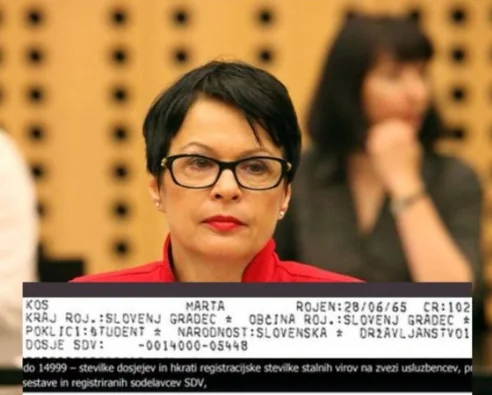Marta Kos, the latest candidate for the post of European Commissioner from Slovenia, denies ever having been a collaborator of the UDBA or the Directorate for State Security, the former secret political police of the Yugoslav communist regime. Before the presidential elections, in which she also partook, parts of the official archive documentation were leaked to the media, proving otherwise. Igor Omerza, an expert on the workings of the Directorate for State Security, a publicist and archive researcher, has now explained what the (publicly available) information means.
The following archival markings attest to the fact that Kos was a source for the UDBA (accession no. 452234, UDBA file: -0014000-05448). Igor Omerza explained what this information really means, stating: “She was a registered source for the Directorate for State Security, that is, a lower level than an associate, I call both a “confidant”. Both were confidants and collaborated with the Directorate. Registered sources were usually promoted to collaborators. A registered source only reports, whereas a collaborator is also proactive. He or she takes orders, participates in observations, etc.”
As Omerza explained, there are other terms that can also be used for this type of activity, such as “informers” or “snitches”. They informed the UDBA officials in a variety of ways: orally, through meetings and interviews, sometimes through written letters, and less often by telephone, because they feared eavesdropping. And what did the snitches report on? “UDBA was the political police. It reported on what Kocbek was doing, what Boris Pahor was doing, for example,” said Omerza.

The exact content of Kos’s reports is not yet known to the public today, but we can make inferences about it based on the period of her activity.
“She was already working with the UDBA at college. The website Udba.net is from 1987, so the latest she could be registered as a confidant was in 1987, when she was studying. I don’t know what she reported on, I don’t have any documents on that. She may not have been reporting from the faculty at all, but from some other environment. She also worked at Deutsche Welle, maybe she reported from there,” Omerza noted.
Normalisation of cooperation with the Directorate for State Security and rehabilitation of the previous regime
It was very noticeable that the issue of Kos’s cooperation with the intelligence services during the communist period resonated much more abroad than at home. For example, the media outlet Euronews has explicitly written about this. It seems that cooperation with the secret services of communist countries is somehow normalised in Slovenia, it is part of the “mainstream”. Abroad, such revelations are a burden for politicians.
Our interlocutor explained to us why this is so, and what the reason is for such a staggering difference in responses: “In our country, we honoured the biggest UDBA member, Janez Zemljarič, we honoured the Prime Minister of the failed socialist government, Dušan Šinigoj, and former President Danilo Türk even rewarded Tomaž Ertl, the top UDBA leader and anti-independence activist. In addition, the current authorities have abolished the day of remembrance of the victims of communist violence, so all this proves that there is obviously a policy that wants to rehabilitate the previous regime. I can’t explain it any other way.”
UDBA, Stasi, KGB and intelligence services in democracies
Omerza went on to explain that there are fundamental differences between the UDBA, Stasi, KGB and the intelligence services in democratic societies. “In democracies, the intelligence services defend the state against criminals, terrorists, and violent subversion of the constitutional order, while the political police defend the narrow political or state leadership. It does not defend the state as such, but pursues political enemies, and there is a huge difference between the political police and the intelligence services. If it turned out that today’s intelligence service was following politicians, if something like that happened, it could bring down a government,” said Omerza.
“Political police is an utterly reprehensible thing. It spies on people in their homes, intimidates them and locks them up in prisons. The predecessor of UDBA even liquidated people after the war. The mass post-war killings were the work of UDBA, or, at that time, OZNA (the Department for Protection of the People in Yugoslavia). From the point of view of democratic countries, these are therefore utterly reprehensible organisations,” he concluded.
Ž. K.


